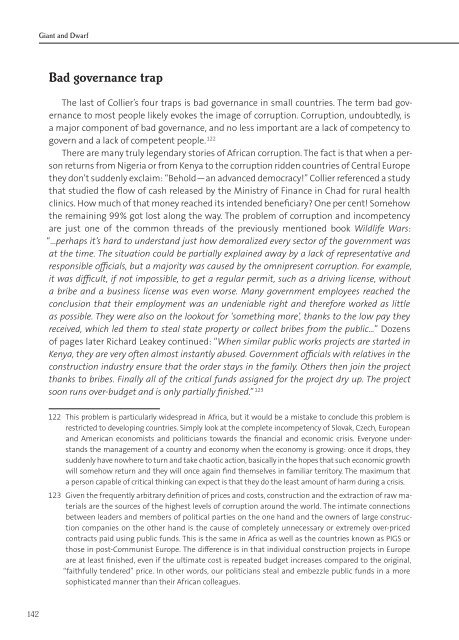Giant_and_Dwarf-FIN
Giant_and_Dwarf-FIN
Giant_and_Dwarf-FIN
You also want an ePaper? Increase the reach of your titles
YUMPU automatically turns print PDFs into web optimized ePapers that Google loves.
<strong>Giant</strong> <strong>and</strong> <strong>Dwarf</strong>Bad governance trapThe last of Collier’s four traps is bad governance in small countries. The term bad governanceto most people likely evokes the image of corruption. Corruption, undoubtedly, isa major component of bad governance, <strong>and</strong> no less important are a lack of competency togovern <strong>and</strong> a lack of competent people. 122There are many truly legendary stories of African corruption. The fact is that when a personreturns from Nigeria or from Kenya to the corruption ridden countries of Central Europethey don’t suddenly exclaim: “Behold—an advanced democracy!” Collier referenced a studythat studied the flow of cash released by the Ministry of Finance in Chad for rural healthclinics. How much of that money reached its intended beneficiary? One per cent! Somehowthe remaining 99 % got lost along the way. The problem of corruption <strong>and</strong> incompetencyare just one of the common threads of the previously mentioned book Wildlife Wars:“...perhaps it’s hard to underst<strong>and</strong> just how demoralized every sector of the government wasat the time. The situation could be partially explained away by a lack of representative <strong>and</strong>responsible officials, but a majority was caused by the omnipresent corruption. For example,it was difficult, if not impossible, to get a regular permit, such as a driving license, withouta bribe <strong>and</strong> a business license was even worse. Many government employees reached theconclusion that their employment was an undeniable right <strong>and</strong> therefore worked as littleas possible. They were also on the lookout for ‘something more’, thanks to the low pay theyreceived, which led them to steal state property or collect bribes from the public...” Dozensof pages later Richard Leakey continued: “When similar public works projects are started inKenya, they are very often almost instantly abused. Government officials with relatives in theconstruction industry ensure that the order stays in the family. Others then join the projectthanks to bribes. Finally all of the critical funds assigned for the project dry up. The projectsoon runs over-budget <strong>and</strong> is only partially finished.” 123122 This problem is particularly widespread in Africa, but it would be a mistake to conclude this problem isrestricted to developing countries. Simply look at the complete incompetency of Slovak, Czech, European<strong>and</strong> American economists <strong>and</strong> politicians towards the financial <strong>and</strong> economic crisis. Everyone underst<strong>and</strong>sthe management of a country <strong>and</strong> economy when the economy is growing: once it drops, theysuddenly have nowhere to turn <strong>and</strong> take chaotic action, basically in the hopes that such economic growthwill somehow return <strong>and</strong> they will once again find themselves in familiar territory. The maximum thata person capable of critical thinking can expect is that they do the least amount of harm during a crisis.123 Given the frequently arbitrary definition of prices <strong>and</strong> costs, construction <strong>and</strong> the extraction of raw materialsare the sources of the highest levels of corruption around the world. The intimate connectionsbetween leaders <strong>and</strong> members of political parties on the one h<strong>and</strong> <strong>and</strong> the owners of large constructioncompanies on the other h<strong>and</strong> is the cause of completely unnecessary or extremely over-pricedcontracts paid using public funds. This is the same in Africa as well as the countries known as PIGS orthose in post-Communist Europe. The difference is in that individual construction projects in Europeare at least finished, even if the ultimate cost is repeated budget increases compared to the original,“faithfully tendered” price. In other words, our politicians steal <strong>and</strong> embezzle public funds in a moresophisticated manner than their African colleagues.142


